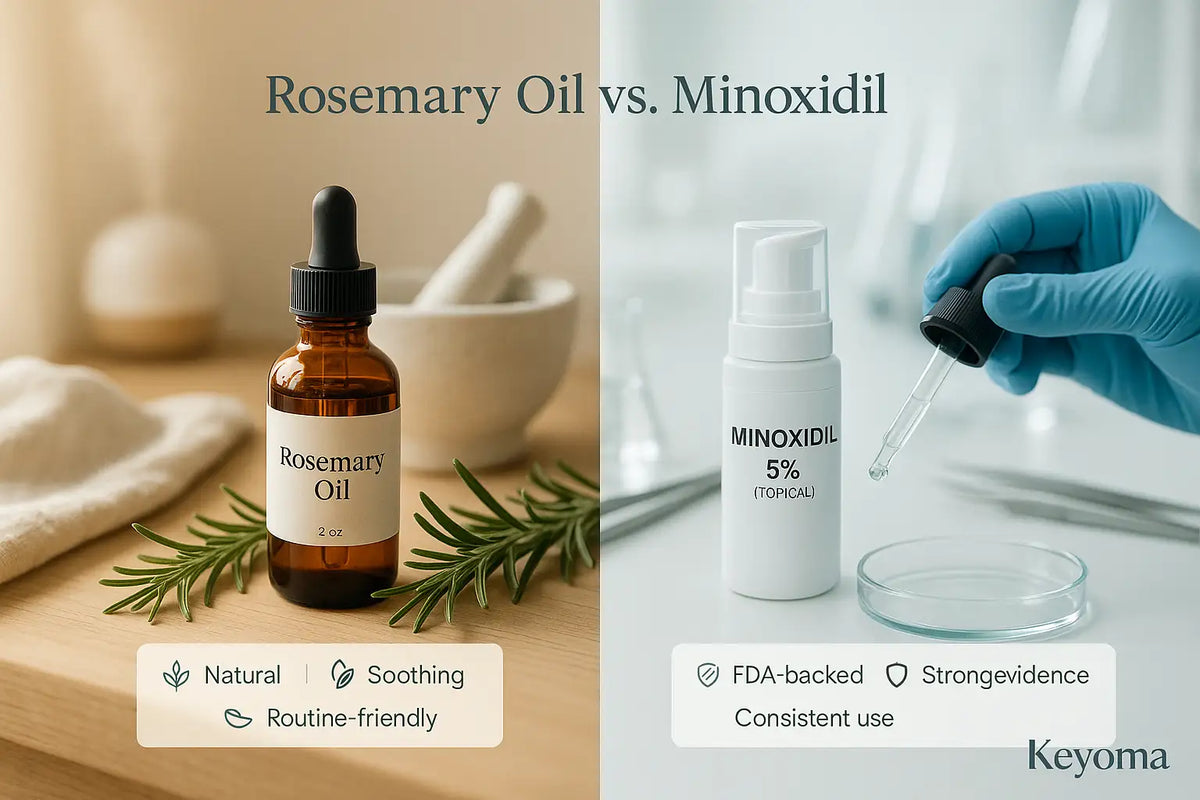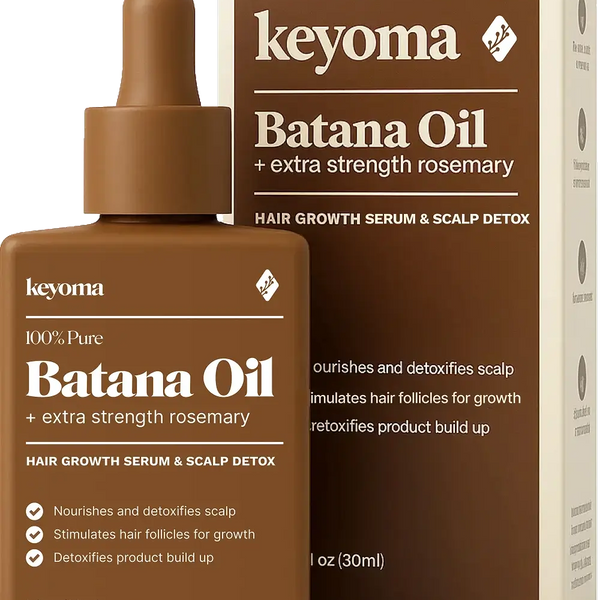Last updated
Aug 24, 2025
Rosemary Oil vs Minoxidil: What Studies Show and How to Use Them Together
Published on
Aug 24, 2025

In this article
You have a lot to consider when choosing between rosemary oil and minoxidil. Both may support hair growth, but how do they stack up?
You’re likely here wondering whether minoxidil or rosemary oil works better for hair loss. The internet is packed with mixed opinions, but you can rely on answers grounded in science.
In this guide, we will review research on the effectiveness of minoxidil versus rosemary oil for hair loss, their side effects, and whether combining them is a smart idea.
Key Takeaways
-
Rosemary oil contains antioxidants and anti-inflammatory compounds that may improve circulation and support hair growth, with fewer reported side effects.
-
Minoxidil is FDA-approved with decades of research showing it slows hair loss and stimulates regrowth, though side effects like scalp irritation can occur.
-
A 2015 study found rosemary oil and 2% minoxidil produced similar hair growth after six months, though itching was more common with minoxidil.
-
Minoxidil has stronger long-term evidence, while rosemary oil offers a natural alternative but needs more large-scale studies.
How Rosemary Oil Works
The benefits of rosemary oil for hair and scalp likely relate to its antioxidant and anti-inflammatory compounds. These include carnosic acid, α-pinene, 1,8-cineole, camphor, and borneol. Such molecules help neutralize free radicals, which in high amounts can harm skin, follicles, and blood vessel cells.

Other compounds like caffeic acid, 1, 8-cineole, and rosmarinic acid may offer pro-circulatory effects similar to minoxidil. In one study of rosemary extract for atherosclerosis prevention, blood vessel function improved significantly.
Benefits of Rosemary Oil
The following are the benefits of using rosemary oil in your hair care routine:
1. Supports Hair Growth
Rosemary Oil is a common pick when you want thicker hair. It can stimulate the scalp, support circulation, and encourage growth.
2. Helps Reduce Dandruff
Its antifungal activity may help reduce dandruff. Mix a few drops into your shampoo to support a healthier-feeling scalp.
3. Helps Relieve Muscle Pain
After a long day or tough workout, Rosemary Oil can help soothe sore muscles. Its anti-inflammatory properties may ease aches when used for massage.
4. Helps Lift Mood
The aromatic scent of Rosemary Oil can feel refreshing. Diffusing it or applying it topically may help reduce stress and support a better mood.
5. Works as a Natural Deodorizer
The fresh, herbaceous scent makes Rosemary Oil a simple natural deodorizer. Use it in the air or on skin to keep things smelling clean.
6. Helps Repel Insects
Tired of bug bites? Rosemary Oil can act as a natural insect repellent. A few drops may help keep pests away.
How Minoxidil Works
The FDA first approved minoxidil to treat male pattern hair loss in 1988. In the years that followed, the agency allowed over-the-counter sales of a 2% topical solution and a 5% topical foam. You may know it as ROGAINE®. You’ll still need a prescription for oral minoxidil.

Even after decades of use, the exact way minoxidil promotes hair growth is not fully understood. Minoxidil opens potassium channels and dilates blood vessels, increasing circulation and nutrient exchange around hair follicles. This improved flow likely supports thicker strands and overall growth.
Benefits of Minoxidil
Here are the benefits of minoxidil:
1. Encourages Hair Regrowth
Minoxidil can stimulate hair follicles and encourage regrowth. If you’re noticing thinning or balding, it may help you achieve fuller-looking hair.
2. Helps Slow Hair Loss
It can also slow the progression of hair loss. With regular use, you may maintain current density and delay further thinning.
3. Revives Hair Follicles
By boosting blood flow to the scalp, minoxidil can revive miniaturized follicles and increase their size. This extends the growth phase of the hair cycle, leading to thicker, longer strands.
4. Available Over the Counter
You can purchase minoxidil over the counter, making it accessible if you want to begin without a prescription.
5. Available in Multiple Formulations
You can choose among topical solutions and foams to match your preferences and routine.
6. Backed by Clinical Evidence
Minoxidil has extensive clinical research demonstrating its ability to promote hair growth and slow loss. These results make it a dependable treatment choice.
Rosemary Oil vs. Minoxidil: Key Differences
When you compare rosemary oil with minoxidil, the differences matter for real life. The points below break down where each one comes from, how strong the evidence is, and what daily use looks like.

Use them to match your choice to your goals, your tolerance for side effects, and the routine you can keep up. The goal is not to pick a single winner, but to help you choose what you will actually use consistently.
Natural vs. Chemical
Rosemary Oil: Derived from Rosmarinus officinalis, rosemary oil has a long history in hair care. As a natural option, it supplies antioxidants that help shield follicles and reduce inflammation.
Minoxidil: Minoxidil is a topical medication with FDA approval for hair loss. It is effective, but potential side effects come with its drug profile.
Scientific Evidence
Rosemary Oil: Some studies suggest hair-stimulating effects. Research reported in Skinmed found that six months of use increased hair count and thickness.
Minoxidil: Minoxidil has a longer track record of controlled studies and FDA oversight, showing strong evidence for promoting growth. As a pharmaceutical, it has benefited from significant research funding.
Ease of Use
Rosemary Oil: Add a few drops to a carrier oil, massage into your scalp, and leave on for a few hours or overnight.
Minoxidil: Apply the topical solution or foam daily. It works, but it requires consistent use.
Rosemary Oil vs. Minoxidil: Side Effects for Hair Loss
Side effects from both rosemary oil and topical minoxidil are usually mild and limited to where you apply them.
The 2015 head-to-head study found no difference in dryness, greasiness, or dandruff between groups. It did report a slightly higher rate of itchy scalp with minoxidil.
If you get irritation or redness from topical minoxidil, researchers think the reaction could be due to propylene glycol, an alcohol in some formulas, rather than the minoxidil itself. FYI: if you use our minoxidil foam, it doesn’t contain propylene glycol.
However, user error can raise the risk of rosemary oil side effects. Essential oils that aren’t diluted can cause contact dermatitis or other irritation.
Next Steps for Regrowth: Support Your Plan With Keyoma
Evidence supports both rosemary oil and minoxidil for hair loss, but we have far more long-term data on minoxidil’s efficacy and safety.
For that reason, you can consider minoxidil the better option for hair regrowth, especially if you want a treatment with the strongest track record.
If you also want a simple, natural scalp oil in your routine, pair your treatment with Keyoma batana oil with rosemary to support scalp care.
Featured Product
100% Pure Batana Oil + Rosemary
Learn more about Batana Oil
Your Cart
Your Cart is empty
Let's fix that
You might like...
Search our store








